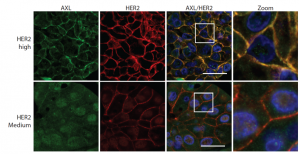“What my patients with early stage breast cancer really fear is to hear the word ‘metastasis’.” Most oncologists would agree with this statement, which I once heard from a presenter at the San Antonio Breast Cancer Symposium. There is no doubt that being told you have metastatic breast cancer is a lot to take in, as it means that breast cancer has spread beyond the breast to other parts in the body. The disease becomes more advanced the farther it spreads. And, unfortunately, it also becomes incurable.
How can the appearance of metastases be prevented? One of the ways to address this issue – and probably the most promising – originates from the field of molecular biology and biochemistry.
Dr. Jean-François Côté, Director of the Cancer and Genetic Diseases Division in Montreal Clinical Research Institute (IRCM), explores the molecular signals that allow cancer cells to seed and grow new tumors, and how to stop this spread. Along with his research team, he looks at signalling pathways that control cell migration. One of the team’s current projects focuses on breast cancer. Recently, Dr. Côté visited the Cancer Research Institute at Queen’s University and shared details of this research during a seminar titled “Unravelling the complexity of metastasis: Characterizing the roles of the receptor tyrosine kinase AXL in metastatic progression.”
Clinical Research Institute (IRCM), explores the molecular signals that allow cancer cells to seed and grow new tumors, and how to stop this spread. Along with his research team, he looks at signalling pathways that control cell migration. One of the team’s current projects focuses on breast cancer. Recently, Dr. Côté visited the Cancer Research Institute at Queen’s University and shared details of this research during a seminar titled “Unravelling the complexity of metastasis: Characterizing the roles of the receptor tyrosine kinase AXL in metastatic progression.”
What is the research agenda of Dr. Côté’s team? Statistics indicate that the majority of breast cancer deaths occur because of the manifestation of metastases. The metastatic process is complex: cancer cells detach from a primary tumour, enter nearby blood vessels, and migrate in the vascular system. Throughout this process, cancer cells exchange signals, and such signaling pathways drive tumor progression and metastasis after cancer cells reach and survive at secondary sites.
In a nutshell, AXL is a cell surface receptor. As Dr. Côté explains, the expression of AXL correlates with the appearance of metastases in several types of cancers, including breast cancer. AXL stimulates cell proliferation promoting cell survival, resistance, invasion, and metastasis. In other words, signals from AXL help malignant cells grow and spread to distant areas in the body.

The mechanism AXL uses to perform its pro-metastatic role is still not completely clear. To identify signaling networks controlled by AXL, Dr. Côté borrowed proteomics approaches – protein-based analysis methods that help estimate the relative and absolute amounts of thousands of proteins across diverse biological systems. Proteomic technologies are in high demand in cancer studies as they have the potential to lead to the discovery of new therapeutic targets and improve the precision of anti-cancer treatments.
What unites researchers in the cancer field all over the world is the understanding that a “one-size-fits-all” strategy for treating cancer no longer works. We live in the era of a tailor-made individualised approach. Searching for ways to personalize breast cancer treatment is considered the most promising way forward for leading cancer researchers. As researchers such as Dr. Côté and his team learn more about the molecular mechanisms controlling signaling by the receptor tyrosine kinase AXL, they are better able to move forward and identify some pharmacologic targets for treating breast cancer. The next major step will be designing novel anti-cancer therapies that will work better than conventional untargeted chemotherapy. “Old-school” chemotherapy kills without distinction. Targeted drugs attack breast cancer without harming benign cells.
Dr. Côté also employs in vivo approaches. In vivo (Latin for “within the living”) means that an investigator uses a whole, living organism in research. Regarding cancer studies, in vivo testing involves mouse models and human patient-derived xenografts. In the case of xenografts, human tumor cells are transplanted into a mouse. This allows the design of a model with the same biological parameters as an actual cancer patient. Obviously, this is a perfect way to observe the overall effect of an experiment using a living subject, while not harming people.
Much has been achieved in research and much more remains to be done, as Dr. Côté says. To date, findings indicate that the receptor tyrosine kinase AXL is a promising therapeutic target for breast cancer therapy. “Our results suggest that inhibition of AXL would be beneficial in limiting the spread of breast cancer,” argues Dr. Côté.
Natalia Mukhina –
Health journalist, reporter and cancer research advocate

Natalia Mukhina, MA in Health Studies, is a health journalist, reporter and cancer research advocate with a special focus on breast cancer. She is blogging on the up-to-date diagnostic and treatment opportunities, pharmaceutical developments, clinical trials, research methods, and medical advancements in breast cancer. Natalia participated in numerous breast cancer conferences including 18th Patient Advocate Program at 38th San Antonio Breast Cancer Symposium. She is a member of The Association of Health Care Journalists (AHCJ).




